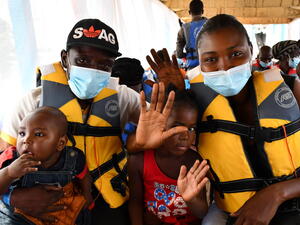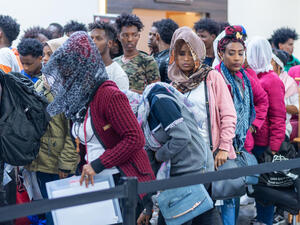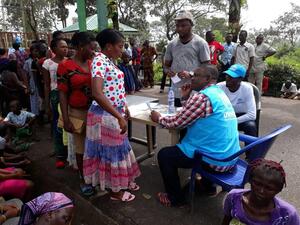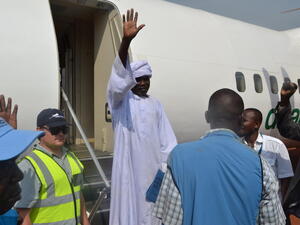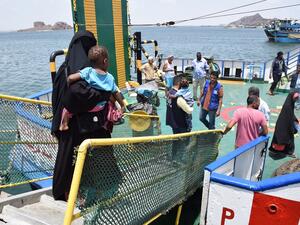Guinea: Sierra Leoneans' perilous journey out
Guinea: Sierra Leoneans' perilous journey out
Hundreds of Sierra Leonean refugees are leaving Guinea's troubled Parrot's Beak region and walking through rebel-held borderlands to the Kenema area in south-eastern Sierra Leone, a perilous journey that can take up to 14 days.
More than 700 such arrivals have been registered by local authorities and UNHCR staff in Kenema over the past four weeks, and the numbers are increasing. On Wednesday, 58 people who had walked back from Guinea were registered by local Sierra Leonean authorities and UNHCR staff in Kenema. On some days, as many as 125 new arrivals on foot have been registered. Others are believed to have avoided registration by going straight to the homes of relatives.
UNHCR is increasing the capacity of returnee settlements in the Kenema area in anticipation of more arrivals. The refugees, fleeing various camps in insecure parts of Guinea, have been crossing rebel-held territory to the north of Kenema. They usually move in small groups during the day, then gather in larger numbers for safety at night. Some have walked 70 miles or more. One woman said she and her two children spent 41 days trekking across the rebel-held Kono district to reach Kenema. Most returnees, however, said it took between two and 14 days.
Many refugees said they came from Kolomba camp at the tip of the Parrot's Beak, a thumb of Guinean territory jutting into Sierra Leone. Others came from refugee camps around the Guinean town of Guéckédou, including Katkama, Nyaedou and Sayanin. Some reported having received assistance from the Guinea military to find their way to the border on the Guinean side. Others, however, reported harassment and theft by Guinean soldiers.
Most of the returnees are from rebel-held areas of Sierra Leone and cannot yet go back to their homes of origin. Despite the difficulties in Sierra Leone, the returnees say it is more dangerous to remain in strife-torn south-western Guinea. Most of those arriving in Kenema are women and children. Men are reportedly staying behind out of fear of being forcibly recruited by rebels. Several accounts from those who have reached Kenema tell of rebels holding young men, presumably for forced labour. One woman said her husband was among some 200 men who were taken from a large group of returnees one night as they tried to transit the Kono District. Three young men said they were held for two weeks and forced to do domestic chores.
Most of the returnees are in good physical condition despite the ordeal. They are being taken to UNHCR's Jembe temporary resettlement site, 32 km west of Kenema, where they receive blankets, soap, a lamp and kitchen set. Jembe is presently hosting some 3,000 returnees - about 600 of whom returned on foot. The others travelled back to Sierra Leone by boat from the Guinean capital of Conakry. They are being transported from the wharf in Freetown to Kenema in UNHCR convoys. Another return site is being developed by UNHCR at Gerihun, 54 km west of Kenema. Gerihun is already home to about 1,000 returnees.
The returnees are given a plot of land and material to build a wood and mud shelter. They also receive monthly food rations. Most of the returnees originate from the Kono and Kailahun districts and say they will not return home until they know it is safe.
In view of the present pace of returns, UNHCR is gearing up for more temporary resettlement sites in the Kenema area, since a majority of refugees in Guinea's south-western region originate from Kono and Kailahun districts. While Jembe and Gerihun can accommodate 6,000 and 12,000 returnees respectively, other sites are being considered in Taiama and Bandajuma, near Bo, for a total capacity of 20,000 people.
Since last September, nearly 45,000 former refugees have returned to Sierra Leone by foot or by bus and boat from Conakry to Freetown.
In Guinea, meanwhile, refugees who fled an attack last Friday on the southern Guinean town of Nongoa continue to stream into Katkama camp, north of Guéckédou. By last night, UNHCR had registered nearly 4,500 refugees who have arrived in the transit camp over the last few days.




